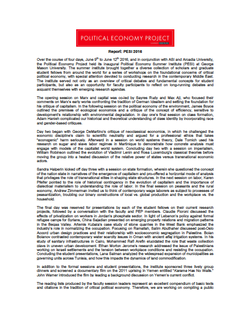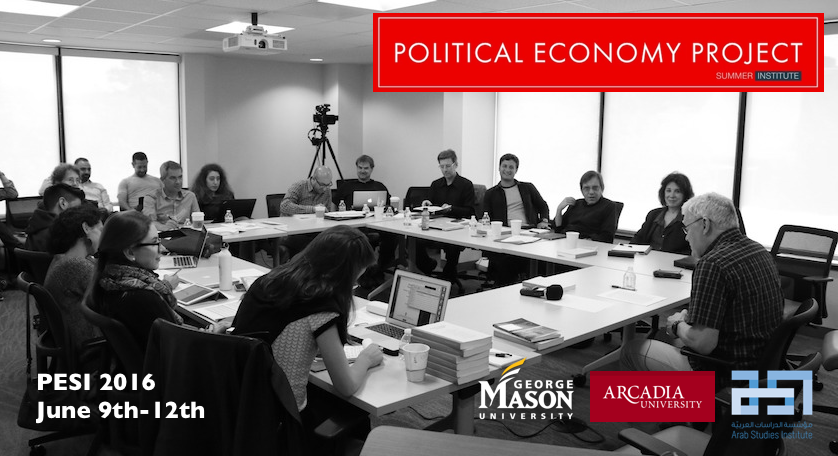- FAMA
- Researchers
-
Projects
- MESPI
- Knowledge Production Project >
-
Political Economy Project
>
- Development and the Uprisings
- Class Formations and Dynamics
- The Palestinian Economy: Fragmentation and Colonization
- Tunisia: A Political Economy in Transition
- Migrant States, Mobile Economies: Rethinking the Political in Contemporary Turkey
- Political Economy of the Middle East: Continuities & Discontinuities in Teaching & Research
- 2016 Political Economy Institute
- The Lebanon Project >
- The Palestine Project >
- The Civil Society Project >
- Middle East Media Project >
- The Egypt Project >
- Refugees and Migrants Project >
- Black-Palestinian Transnational Solidarities Project
- Initiatives
- Events
- Summer Institutes
- Internships
- Blog
 Over the course of four days, June 9th to June 12th 2016, and in conjunction with ASI and Arcadia University, the Political Economy Project held its inaugural Political Economy Summer Institute (PESI) at George Mason University. The summer institute brought together a diverse collection of scholars and graduate student fellows from around the world for a series of workshops on the foundational concerns of critical political economy, with special attention devoted to conducting research in the contemporary Middle East. The institute served not only as an overview of critical debates and fundamental concepts for student participants, but also as an opportunity for faculty participants to reflect on long-running debates and acquaint themselves with emerging research agendas. The opening session on Marx and capital was co-led by Sayres Rudy and Max Ajl, who focused their comments on Marx’s early works confronting the tradition of German Idealism and setting the foundation for his critique of capitalism. In the following session on the political economy of the environment, James Boyce outlined the premises of ecological economics and a critique of the concept of efficiency, sensitive to development’s relationship with environmental degradation. In day one’s final session on class formation, Adam Hanieh complicated our historical and theoretical understanding of class identity by incorporating race and gender-based critiques. Day two began with George DeMartino’s critique of neoclassical economics, in which he challenged the economic discipline’s claim to scientific neutrality and argued for a professional ethics that takes “econogenic” harm seriously. Afterward in a session on world systems theory, Dale Tomich used his research on sugar and slave labor regimes in Martinique to demonstrate how concrete analysis must engage with models of the capitalist world system. Concluding day two with a session on imperialism, William Robinson outlined the evolution of Vladimir Lenin and Rosa Luxemburg’s classical theories before moving the group into a heated discussion of the relative power of states versus transnational economic actors. Sandra Halperin kicked off day three with a session on state formation, wherein she questioned the concept of the nation state in narratives of the emergence of capitalism and pro-offered a horizontal mode of analysis that privileges the role of transnational elites in shaping state structures. In the next session on labor, Karen Pfeifer pointed to the role of historical contingency in the evolution of capitalism and the importance of dialectical materialism to understanding the role of labor. In the final session on peasants and the rural economy, Andrew Zimmerman invited us to think of contemporary wage laborers as subject to processes of peasantization, troubling our binary constructions of local vs. global production and the workplace vs. the household. The final day was reserved for presentations by each of the student fellows on their current research projects, followed by a conversation with the faculty and PEP members. Claudie Fioroni discussed the effects of privatization on workers in Jordan’s phosphate sector. In light of Lebanon’s policy against formal refugee camps for Syrians, China Sajadian presented on emerging property relations and migration patterns in the Beqaa Valley. Artemis Kubala’s case study of stone quarries in the West Bank emphasized the industry’s role in normalizing the occupation. Focusing on Ramallah, Salim Abuthaher discussed post-Oslo Accord urban design practices and their relationship with socioeconomic segregation in Palestine. Boian Boianov contrasted contemporary water scarcity issues in Oman with ancient aflaj irrigation systems. In his study of sanitary infrastructures in Cairo, Mohammed Rafi Arefin elucidated the role that waste collection plays in uneven urban development. Ethan Morton Jerome’s research addressed the issue of Palestinians working on Israeli settlements and the tension between workplace conditions and resisting the occupation. Concluding the student presentations, Lana Salman analyzed the widespread expansion of municipalities as governing units across Tunisia, and how this impacts the dynamics of land commodification. In addition to the formal sessions and student presentations, the institute sponsored three lively group dinners and screened a documentary film on the 2011 uprising in Yemen entitled “Karama Has No Walls.” John Warner introduced the film by leading a background discussion on Yemen’s current conflict. The reading lists produced by the faculty session leaders represent an excellent compendium of basic texts and citations in the tradition of critical political economy. Therefore, we are working on compiling a public PESI reading list in coordination with PEP’s annotated bibliography project. Looking forward, we are collecting feedback from this year’s participants and have already started planning for the 2017 workshop. Overall, the inaugural Political Economy Summer Institute was an overwhelming success.
2 Comments
Leave a Reply. |
Forum on Muslim and Arab AffairsFAMA is the research arm of the Arab Studies Institute. Archives
June 2017
Categories |
- FAMA
- Researchers
-
Projects
- MESPI
- Knowledge Production Project >
-
Political Economy Project
>
- Development and the Uprisings
- Class Formations and Dynamics
- The Palestinian Economy: Fragmentation and Colonization
- Tunisia: A Political Economy in Transition
- Migrant States, Mobile Economies: Rethinking the Political in Contemporary Turkey
- Political Economy of the Middle East: Continuities & Discontinuities in Teaching & Research
- 2016 Political Economy Institute
- The Lebanon Project >
- The Palestine Project >
- The Civil Society Project >
- Middle East Media Project >
- The Egypt Project >
- Refugees and Migrants Project >
- Black-Palestinian Transnational Solidarities Project
- Initiatives
- Events
- Summer Institutes
- Internships
- Blog



 RSS Feed
RSS Feed
